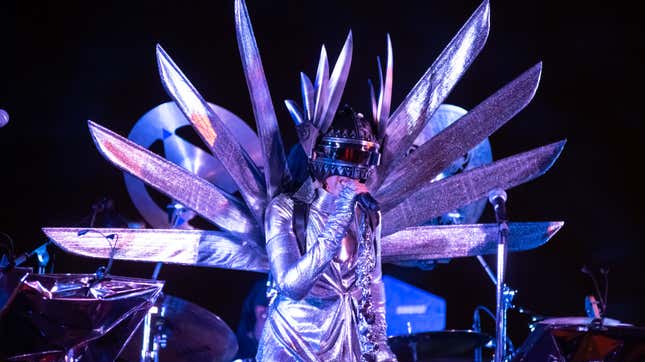
When I was a child watching reruns of Star Trek, one of the things I always wondered was … where did all the black people go? Sure, there was actress Nichelle Nichols’ Uhura and she was amazing. And later, on series like Star Trek: Next Generation there was Geordi La Forge and, even later, Benjamin Sisko (and his whiny, wannabe journalist son) from Star Trek: Deep Space Nine, but as a black girl-child growing up in the very diverse city of St. Louis, Mo., where black people delivered our mail, were my teachers, neighbors, preachers, and friends, it seemed like we were everywhere. Yet in space, nowhere.
I would conjure up apocalyptic futures for black people, elaborate backstories to explain our absence. None seemed that appealing. After all, I wanted there to be a future for us, somewhere, and a future that was better than the present day and past we’ve lived in thanks to slavery and colonialism.
Enter a very jazzy, funkadelic Sun Ra, calling to all the black people, that “Space is the Place,” not just for exploration of a new frontier but that space is the place for us, by us. Born in 1914 and departed from this realm in 1993 at age 79, the Alabama native was best known for his Afrofuturist-themed jazz, addressing every issue from nuclear war to interstellar love, along with his rotating band, the Arkestra. Singer-songwriter Nona Hendryx, best known for her immense body of work in R&B, funk, soul and new wave (as well as her stint as a member of Patti LaBelle and the Bluebelles), donned her best space-age garb, a blistering silver suit and headset, and set on Saturday night to celebrate the work of Sun Ra through her concert, Nona Hendryx and the Disciples of Sun Ra in the Temple, at the Metropolitan Museum’s Temple of Dendur in the Sackler Wing of the Egyptian gallery. The performance was part of Harlem Stage’s yearlong WaterWorks series, The Cosmic Synthesis of Sun Ra and Afrofuturism, led by Hendryx, the artistic director.
Transforming herself into the “Cyboracle,” Hendryx describes Afrofuturism as “Afro-present and Afro-past, it is not only fiction, it is not only science, it is a possible future created in the mind, projected and seen through the lens of the African diaspora, it is part science fiction and fact.”
With Craig Harris, an original member of Sun Ra’s Arkestra in tow as musical director, the Saturday night performance included songs like “Space Is the Place” and “Enlightenment,” punctuated by afrofuturistic dancers, dressed in Afro-Egyptian-Indigenous costumes, who were “living sculptures” with costumes influenced by the museums Native Collection by Virgil Ortiz. As Hendryx sang and swayed along with Harris and their large backing band, the dancers slinked and skulked, pranced and poked among the packed audience of onlookers in the Temple of Dendur.
The performance, which was at times sonically melodic and alarming (a woman in front of me repeatedly had to put her fingers in her ears due to how loud it could occasionally get), was a beautiful tribute to Sun Ra’s jazz legacy and afrofuturist vision, bringing to mind a sort of Black Panther and Dora Milaje go on an acid trip to Mars for a funky, psychedelic good time in 1979, chanting about how we’re all “cosmic dust.”
You can learn more about Hendryx’s journey into Sun Ra’s mind’s eye at Harlem Stage in New York City.



